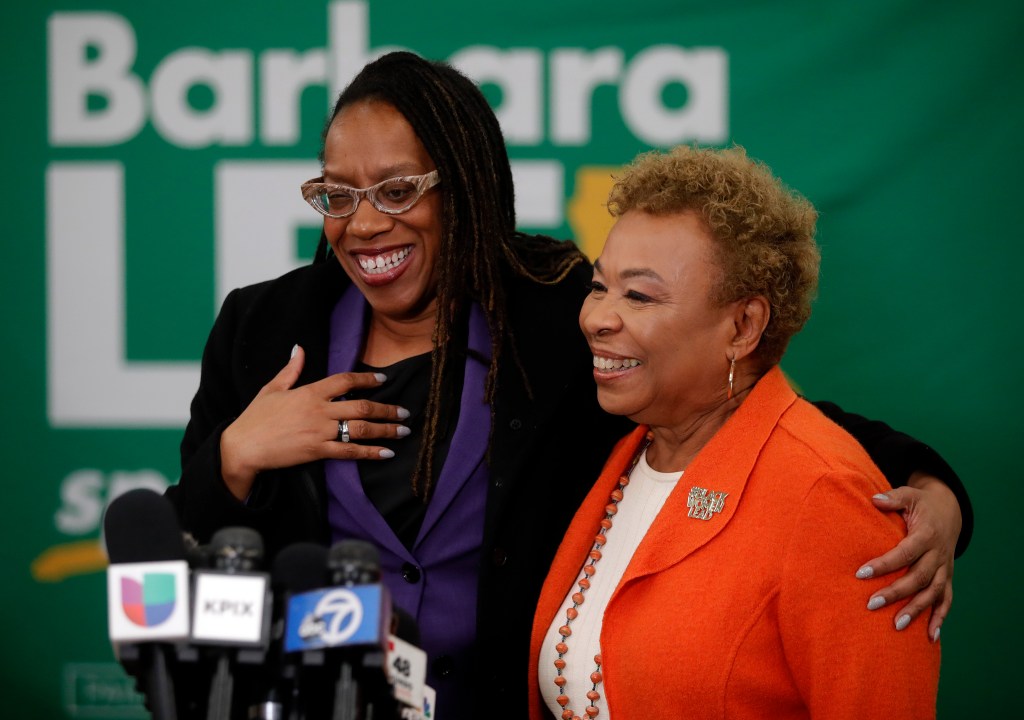
Fresh off a speech at the Democratic National Convention, California District 12 candidate Lateefah Simon appears to be the next Democratic rising star–but her opponent Jennifer Tran believes she can upset the upstart with a slate of innovative policies.
The candidates are competing to succeed Rep. Barbara Lee and join the next generation of progressives in the 119th Congress. Back in District 12, which encompasses Alameda, Albany, Berkeley, Oakland, Piedmont and San Leandro, they face deep-rooted issues of unaffordable housing, public safety and economic inequality.
Simon dominated the March primaries, where she received nearly 56% of the votes in a crowded nine-person field. While Simon leads Tran by 13 points, more than half of District 12 voters are undecided, according to a poll by the University of Southern California and California State University taken between Sept. 14 – 21.
With just weeks to go, Simon feels confident that her campaign is a winning one that will carry on the working-class politics of Rep. Barbara Lee.
“We out-raised and outworked and out-knocked our competition,” Simon said. “I’ve been campaigning – whether it’s issue-based campaigning or running organizations – since I was 19. So campaigning is tough, but working in a hotel and being non-unionized is tougher.”
But Tran has seized on the poll and the number of undecided voters. She has gone on the offensive against Simon in the final weeks of the campaign while attempting to elevate her own platform to use technology advancements to increase government transparency for voters
“My question to the voters of the East Bay is, who is Lateefah Simon?” Trans said, criticizing the absence of Simon’s policy platform on her website. “We’re challenging people to choose policy over popularity.”
Simon’s career began at the Center for Young Women’s Development, a nonprofit focused on helping impoverished young women transition to healthy adulthood. As a homeless single mother herself, she quickly moved up at the organization and became its executive director at 19, eventually earning a MacArthur “Genius” grant in 2003 at the age of 26.
Born legally blind and reliant on public transit, Simon is a BART board member and said “public transportation was, is, and always will be central to my politics.” If elected, she said she would align herself with progressives and champion transportation initiatives from the Green New Deal, a policy platform that seeks to address climate change through job creation and the reduction of income inequality.
“California has to shift its thinking — the nation has to shift its thinking — from highways to public transit. The fossil fuel industry is literally robbing a generation of everything that has to do with the American promise,” Simon said. “We’re going to have to have an emergent fever in moving pragmatic approaches to save this burning planet.”
The pervasive threat of climate catastrophes is why Simon has spent one week of each month in Washington, D.C. to meet with members of Congress on the issue. She said she’s already spoken with Congressional leaders like Rep. Maxine Waters about joining committees on infrastructure, transportation and financial services to support greater investments in the East Bay.
“Public safety and housing are what my folks here care about the most,” Simon said. “In order to be able to move any resources, we have to get the bills that Maxine and others have pushed for.”
Tran has embraced her position in the race, seeking to turn Simon’s advantages on their head. She grew up appreciating the hard work of her father, a Vietnamese refugee who opened a nail salon in Oakland as a single parent. From her upbringing, she’s become the president of the Oakland Vietnamese Chamber of Commerce and an ethnic studies professor at California State University, East Bay.
Tran is campaigning to improve public safety, housing, and government transparency using technology that she said would propel the district into the future.
“For the first time in 25 years, we have an opportunity to elect a new congressperson, and that means setting the course for the next generation,” Tran said. “When we look at the East Bay – a place that’s uniquely located, has great weather and diverse neighborhoods – yet we are in the headlines for the wrong reasons.”
Tran wants to reimagine the East Bay with a novel policy proposal: The Modern Cities Act, which she said would “restore balance, order and basic services” to American cities like her hometown of Oakland with more police and expanded housing vouchers. The legislation would also leverage technology to “democratize the district” by allowing constituents to vote on bills and track government spending via a phone application.
“We’re going to create a portal for the residents of California’s District 12, so that the voters will be able to log into our website and vote on every bill that we have to pass in Congress,” Trans said. “That’s never been done.”
Though Tran is a novice to campaigns, she feels she has an opportunity to be an agent of change for the district.
“I do not feel counted out,” Tran said when asked about her position in the polls. “We feel more energized than ever because this race was about the people. This race is about sensible solutions. This race is about accountability and demanding real change.”
But real change will not come from a mentee of Rep. Barbara Lee, Tran said.
Simon, however, said she is eager to carry on Lee’s progressive legacy, should she win.
“I’ve organized with the Democratic Party. I’ve organized outside of the Democratic Party headquarters,” Simon said. “I’m going to make her proud, and I’m going to make the members of this district proud as well.”

















































